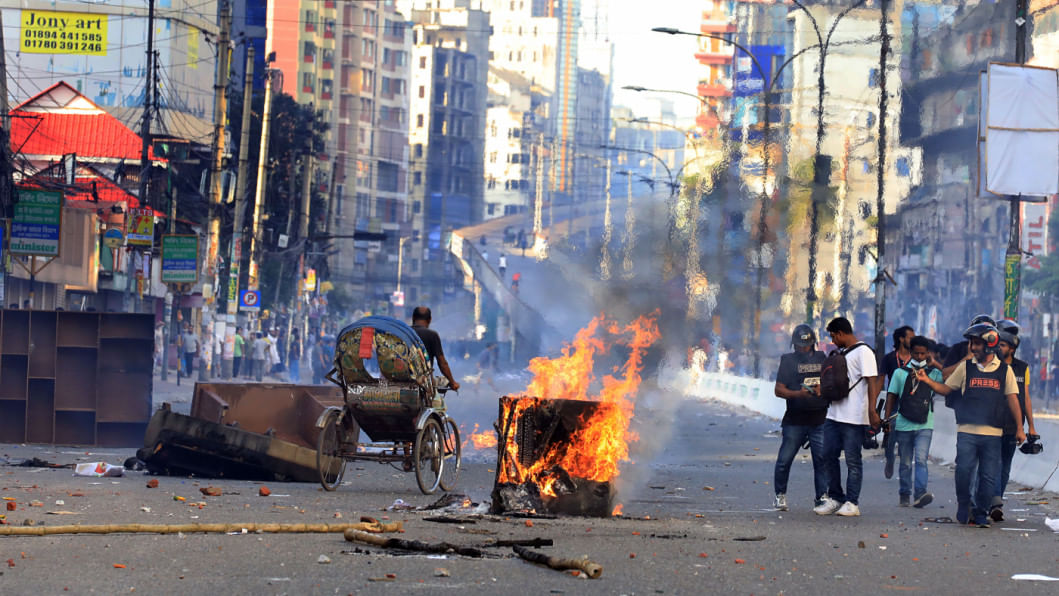Fresh blow to the fragile economy

The countrywide shutdown and subsequent violence centring the quota reform movement crippled business and economic activities for the last three days, dealing a further blow to an economy that is already ailing due to high inflation, falling exports and depleting forex reserves.
Fearing further violence and arson, factories, including those in the biggest export-earning sector of garments, remained shut.
Additionally, passenger and freight vehicles stayed away from plying roads and highways, disrupting the transport of exportable goods and imported items to and from the ports.
At the same time, a countrywide internet blackout affected the assessment of imported and exported goods by the customs, causing indefinite delays in clearance.
The ongoing internet blackout also forced the closure of digital commerce activities for a second consecutive day.
Markets in Dhaka and Chattogram, the two biggest economic hubs of the country, shuttered their stores fearing attacks, with only small neighbourhood shops offering essentials to the few who ventured out.
Over the past few days, several public and private assets were also vandalised and set on fire, which will contribute to losses.
Importantly, such a situation will also impact the image of the country. So, export orders and investment may take a hit.
"On the one hand, this has direct ramifications for export earnings. On the other, the current situation tarnishes the image of our country to international customers," said Syed Tanvir, managing director of Pacific Group, one of the largest garment exporters in Bangladesh.
"Global buyers started to believe that Bangladesh had been able to come out of political volatility. This increased their confidence. Now, they feel bad."
Tanvir added that the imposition of a curfew by the government indicates that the situation is extremely volatile. "We have not seen this in almost two decades."
He added that export shipments would be delayed because of problems in transport, which may have a ripple effect.
As such, he called for a quick resolution to the stalemate.
Kamran T Rahman, president of the Metropolitan Chamber of Commerce and Industry (MCCI), said the situation could have been resolved much earlier.
It is so sad that so many students have been killed, he said.
"Trade and businesses will be impacted. Already, the price level has climbed," he said, adding that investment would be affected too.
To reduce economic losses, a fast solution is necessary. The course of the economy depends largely on a proper resolution to the existing impasse, he added.
Prof Selim Raihan, executive director at the South Asian Network on Economic Modeling (Sanem), said the economy is bleeding.
The political situation will lead to further deterioration of the economy, he added.
The government should have resolved the demands of the students through a dialogue. "This kind of situation could have been avoided in view of the current economic challenges.
"Any disruption to the economic activities is very costly," he added.
The extent of destruction witnessed in the country has raised the alarm for the economy. This type of situation will create uncertainty and it is not good for the economy, Raihan said.
"The supply chain has been disrupted. Activities in the export-oriented sector are almost suspended. Internet-based business activities are down. This will have a major negative impact on the economy."
Faruque Hassan, managing director of Giant Group and a former BGMEA president, said indirect losses would be more costly than direct losses, especially in terms of losing work orders.
A top official of a leading listed drug company, said the pharmaceutical sector usually remains out of the purview of any restrictions. But that is not the case this time around.
"This time, the government did not announce that the curfew would not be applicable for the pharmaceutical sector. So, we had to keep our plants closed."
Due to problems in transporting medicine, many pharmacies remained closed. As a result, drug sales may halve, he added.

 For all latest news, follow The Daily Star's Google News channel.
For all latest news, follow The Daily Star's Google News channel. 








Comments